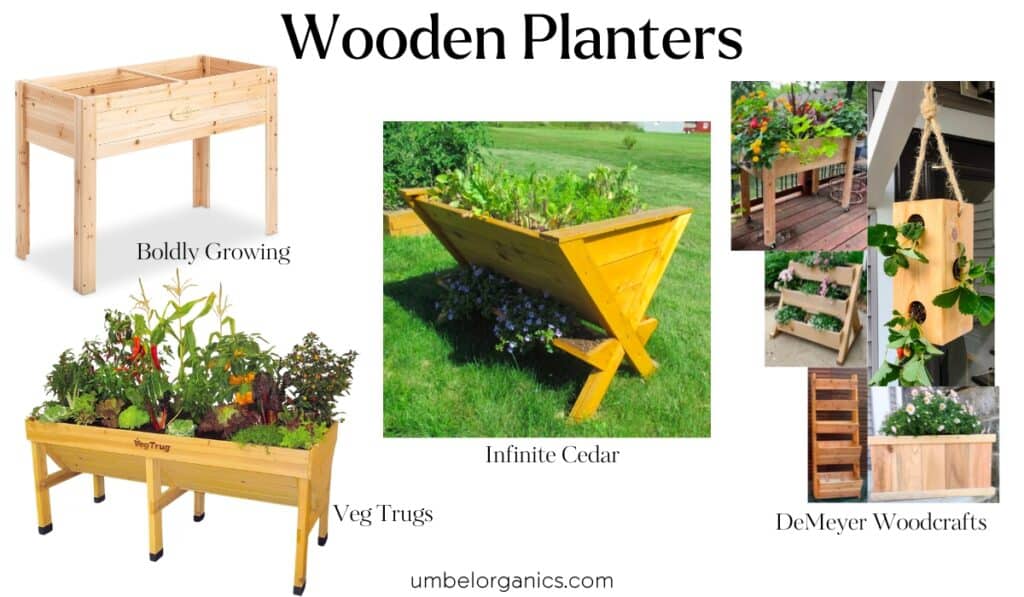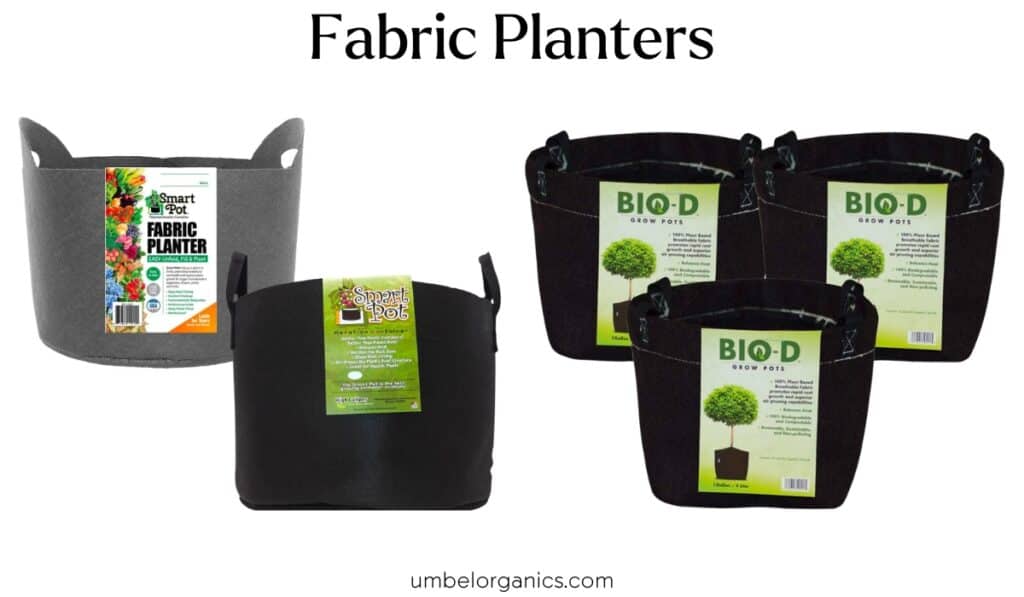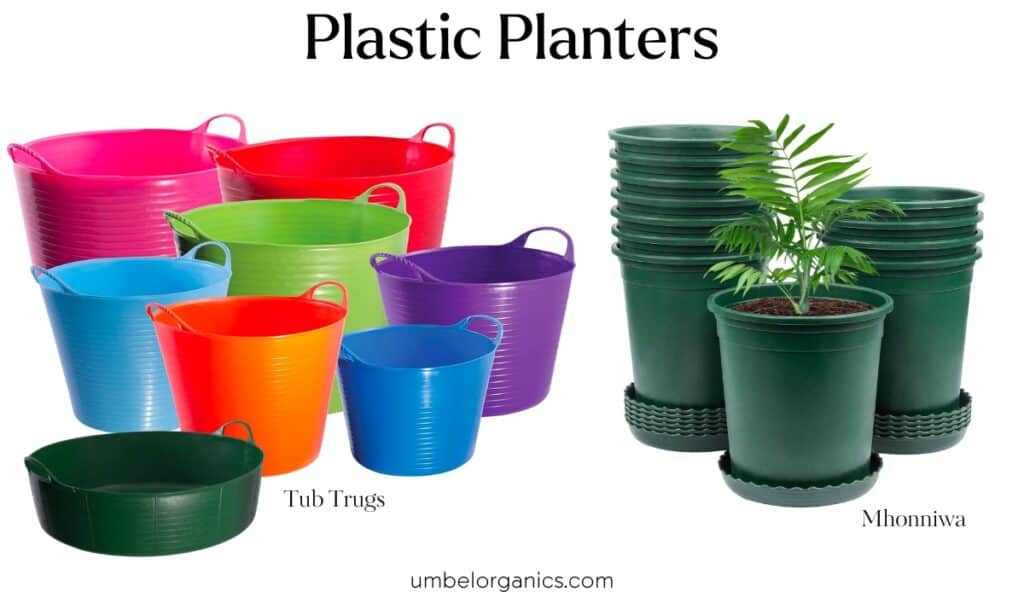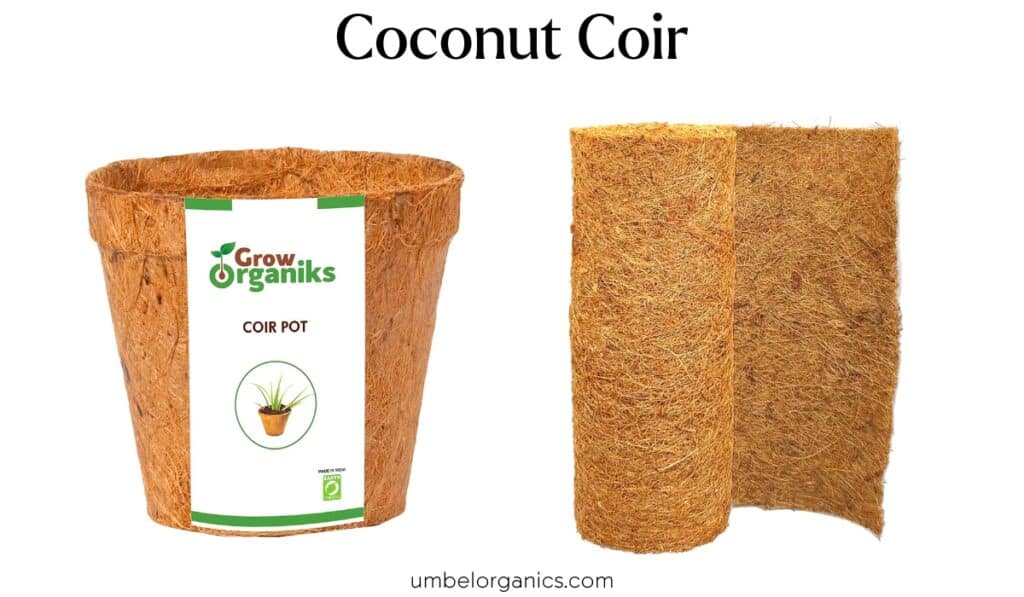The Best Non-Toxic Planters & Containers For Organic Gardening
If you’re an organic gardener, choose non-toxic planters and containers for growing your own food. I’m sharing how to choose a safe container for gardening and the best non-toxic garden planters and containers to grow food in.

Disclosure: This post contains affiliate links, which means if you make a purchase through these links, we may receive a small commission at no extra cost to you.
Whether you’re growing herbs in containers or growing veggies in a raised garden bed, organic gardening is a healthy and fulfilling way to grow your own food. By gardening organically, you have control over what you don’t want sprayed on your veggies and fruit. Conventional produce can have high pesticide residues depending on the fruit or vegetable you’re eating.
You may be confused about choosing the safest container to grow your organic food. Choosing the right container for vegetable gardening is more important than you think, especially considering that chemicals from the container can leach into the soil and be absorbed by the plant. It’s just as important to use non-toxic containers when you’re growing veggies in raised garden beds as it is for growing herbs in containers.
Tips For Choosing A Non-Toxic Garden Planter
Think twice before using recycled or second-hand containers. Don’t use old items like car tires, wooden pallets or railroad ties to grow food in. They contain dangerous chemicals like arsenic, creosote and a whole slew of other harmful chemicals. Items like old painted containers may contain lead.
Check the history of the container. Don’t use containers or plastic buckets that have had past contact with herbicides, fungicides, pesticides or other toxic chemicals.
If you are totally in love with a planter and don’t know its history, double pot it by using the pot you love as an exterior pot and place a non-toxic pot on the inside.
Familiarize yourself with the plastic resin codes associated with the planter you’re about to buy. If you see these “safer” resin code options in the product specifications or on the bottom of the planter, then go ahead and add to your cart:
- Resin Code #4 (LDPE or low-density polyethylene)
- Resin Code #5 (PP or polypropylene)
If you see the following resin codes in the product descriptions or on the bottom of the planter, avoid buying!
- Resin Code #1 (polyethylene terephthalate)
- Resin Code #2 (HDPE or high-density polyethylene)- This used to be in the “safe” category, but I’ve learned that most #2 plastic containers are fluorinated, meaning they will leach PFAS chemicals.
- Resin Code #3 (PVC or polyvinyl chloride)
- Resin Code #6 (polystyrene)
- Resin Code #7 (if it contains PC or polycarbonate, which can leach BPA)
Beyond using non-toxic garden planters and containers for growing your own food, make sure to water your seedlings and plants with a non-toxic hose that doesn’t contain phthalates, heavy metals and PVC. Find out more about building your own raised garden beds here, including what to look for in soil and materials.
Below you’ll find the safest, most non-toxic garden planters and containers that you can grow food in. By choosing safer containers for growing your organic food, you’ll have peace of mind knowing that your organic vegetables are free from harmful toxins.

Seed Starting
Back To The Roots Organic & Plantable Seed Starting Pots andBack To The Roots Greenhouse Germination Kit– These breathable pots provide great drainage and eliminate transplant shock. These eco-friendly pots are 100% compostable, plantable, organic, peat-free. They contain no glues or binders- USDA Certified, 100% Biobased Product, Climate Friendly, 100% Peat-Free, Organic, & Sustainably Sourced Pots.
Vego Garden Seed Starting Trays– The bottom & seedling trays are made of Injection-Molded PPE Plastic (polyethylene- recycling code #4). The seedling tray lid is made with food-grade PET plastic .

Wood Planters
We use cedar wood because it’s durable and naturally bacterial and fungal resistant. Cedar contains natural oils that preserve the wood even in humid climates. Cedar stays cool and insulates the roots of your plants, allowing them to keep absorbing water to feed the rest of the plant. The downside to using wood is that it will break down over time, and can be prone to mold growth.
If you want to treat unfinished cedar wood, we like Nordicare Raw Linseed Oil. It leaves a 100% biological surface and underlines the original natural structure of the wood. 100% cold-pressed linseed oil, food safe.
Boldly Growing Cedar Raised Planter Boxes– Boldy Growing offers 8 different sizes and styles of unfinished cedar raised garden beds with legs and 2 styles of raised garden beds without legs.
Infinite Cedar Raised Garden Beds & Planters– Made in Maine, these high quality cedar raised garden beds and planters are unfinished and come in a variety of different sizes for your gardening needs.
DeMeyer Woodcraft Cedar Garden Planters– Made in Iowa, these high quality cedar vertical garden planters and window and box planters are unfinished and come in a variety of different sizes for your gardening needs.
Veg Trug Raised Planters– Made of durable 100% FSC® wood, the Raised Bed Planter is perfectly suited for outdoor use and features a water-based, food-safe preservative.

Fabric Planters
The benefit of fabric pots is that they are breathable and don’t trap heat. Plastic pots can get pretty hot and actually overheat your plants. Most of the fabric grow pots have handles and are easy to move around if you need to get them out of the sun and into a shady spot.
Bio-D Grow Pots– These 100% biodegradable fabric pots break down naturally so that no waste or trace of them is left behind. BIO-D grow bags are non-woven, needle-punched and made from 100% plant-based fabric. They are available in 1-Gallon, 2-Gallon, 3-Gallon, 5-Gallon, 7-Gallon, 10-Gallon, and 15-Gallon sizes.
Smart Pot Fabric Planters– The Smart Pot is made of clean, non-recycled virgin fabric to avoid heavy metal buildup. The fabric has been independently tested and is BPA free, lead free, and free from other harmful chemicals. The geo-textile fabric is inert and porous. Smart Pot containers are not designed to be composted nor do they biodegrade. The fabric can be recycled in the same way clothing is recycled but there are many ways to repurpose their pots. Smart Pots also make raised garden beds. Here is the Safety Data Sheet.

Metal Planters
Metals tubs can be used as planters, but beware that metal can leach heavy metals into the soil, so you have to choose wisely. Also, metal can get very hot in the sun and heat up your containers, affecting plant health. Galvanized steel is a popular choice for raised garden beds because of its extended durability and corrosion resistance from a zinc-iron coating. The zinc coating has the potential to leach into soil when combined with extreme heat or acidity.
Vego Garden containers are made with 100% non-toxic, eco-friendly materials. The VZ 2.0 Material is a Zinc, Magnesium, and Aluminum coated steel. They have combined this metal with their award-winning AkzoNobel paint to develop a new material, VZ 2.0, which has been verified at the Texas A&M National Corrosion & Materials Reliability Lab. While Aluzinc is quite impervious, the addition of Magnesium to this formula revolutionizes the metal’s ability to resist corrosion. VZ 2.0 has been tested to ensure that it will not leach chemicals into the soil.

Plastic Planters
Plastic pots have both pros and cons. The benefit of a plastic garden pot is that they don’t break easily and come in a wide variety of shapes, sizes and colors. The downside is that a plastic garden pot can leach plasticizer chemicals like Bisphenols and phthalates into the soil and the actual plant. The least toxic plastic pots will have a recycling code #4 and #5. In the past I would have recommended #2 code, but I’ve recently learned that these containers are commonly fluorinated to hold their shape, meaning that they leach PFAS chemicals. Avoid plastic planters with the recycling code #1, #3, #6, and #7, as these have the highest probability of leaching harmful chemicals.
Tubtrugs Planters– These flexible, lightweight polyethylene tubs (recycling code #4) are washable, bendable, crushable and nearly indestructible. They are food grade certified, non toxic and toy safe so are perfect for use in the home and with food. Make sure to look for the Tubtrugs label or Red Gorilla label (this is the manufacturer’s name). Don’t use the Tubtrugs recycled planters, as they are not food safe.
Mhonniwa Nursery Pots– These 1 gallon pots for plants are durable, reusable and easy to move. Made from durable PP (polypropylene) plastic (recycling code #5).

Terracotta Planters
Terra cotta pots are porous, allowing air and moisture to pass through the walls of the pot, which promotes better aeration and drainage for the plant roots, reducing the risk of root rot. Terra cotta pots regulate soil temperature by allowing excess heat to escape through the walls of the pot. The downside of using terra cotta pots is that they are more prone to breakage than pots made from plastic or other materials. They can crack or chip if dropped or mishandled, especially in cold temperatures. They can also lead to faster evaporation of water from the soil, especially in warm or windy conditions, which may require more frequent watering to keep plants adequately hydrated.
The clay used in terra cotta pots can get contaminated with lead through pollution from commercial farming and/or industrial waste. When clay is harvested from deep in the ground it has less chance of contamination. The glaze on a terra cotta pot can also contain lead, especially if it contains metallic colorants.
Wild Rose Home Goods Terra Cotta Planters– I like that some of these planters are raw clay, so there’s no contamination from glazes. Their all-natural porous clay is specially formulated without toxic chemicals to promote healthy and natural plant growth, free of chemical contact. The inside of the planters are intentionally left unglazed so your plant and soil can flourish in a clean and natural environment. All of the glazes are lead-free and non-toxic.

Coconut Coir Planters
Coconut coir pots are biodegradable containers made from the fibrous husk of coconuts. The husks are shredded and then molded into pots of various shapes and sizes. One of the main advantages of coconut coir pots is that they are completely biodegradable. As the plants grow, the roots penetrate the pot walls, and eventually, the pot itself decomposes, providing nutrients to the soil.
Grow Organiks Coconut Coir Pots– these pots come in 4, 8 and 10 inch sizes.
Coconut Coir Garden Container Liner– Easily cutting to fit different shapes and sizes of containers. Made of 100% natural coconut coir fibers.

Alternate Material Planters
Haxnicks Compostable Bamboo Fiber Pot– Made from sustainable bamboo, rice starch and resin made from naturally occurring organic compounds. Will compost in 6-12 months.
Glass Planter– This sheer pot comes equipped with drainage holes to easily prevent overwatering and prolong the life of your plants. Glass will not leach harmful chemicals into the soil, but is prone to breakage.
- TIP: If your container doesn’t have bottom holes, you can use a nail or drill to create drainage holes in the bottom. Smaller containers have less soil, so you may have to water more often.
More Non-Toxic Garden Inspiration


